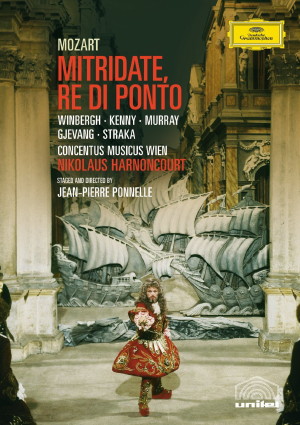 |
1 DVD
- 0440
073 4127 8 - (c) 2006
|
|
Wolfgang Amadeus
Mozart (1756-1791)
|
|
|
|
|
|
Mitridate, re di ponto,
KV 87 (74a)
|
124' 00" |
|
Opera seria in tre atti -
Libretto: Vittorio Amedeo Cigna-Santi
tratto da Jean Racine
|
|
|
|
|
|
| - Ouverture |
5' 16" |
|
| - ACT I |
32' 57" |
|
| - ACT II |
54' 06" |
|
| - ACT III |
31' 15" |
|
|
|
|
BONUS "Mozart's Mitridate
at Vicenza - An introduction by
Jeean-Pierre Ponnelle
|
14' 00" |
|
|
|
|
Gösta
Winbergh, Mitridate, re di
Ponto
|
Jean-Pierre
Ponnelle, staged, directed and
designed |
|
Yvonne
Kenny, Aspasia, promessa
sposa di Mitridate
|
Pet
Halmen, costume designe |
|
Ann
Murray, Sifare, figliulo
di Mitridate
|
|
|
| Anne
Gjevang, Farnace, primo
figliulo di Mitridate |
|
|
| Joan
Rodgers, Ismene, figlia
del re de' parti |
|
|
| Peter
Straka, Marzio, tribuno
romano |
|
|
| Massimiliano
Roncato, Arbate, figliulo
di Mitridate |
|
|
|
|
Concentus Musicus Wien / John
Fisher, cembalo
|
|
|
|
| Nikolaus
Harnoncourt, conductor |
|
|
Luogo e data
di registrazione
|
-
Film: Teatro Olimpico, Vicenza
(Italia) - 5-26 marzo 1986
- Sound: Casino Zögernitz, Vienna
(Austria) - 7-16 ottobre 1985 |
|
Registrazione
live / studio
|
| studio |
Producer / Engineer
|
Horant H. Hohlfeld / Helmut A.
Mühle
|
Edizione DVD
|
Deutsche Grammophon - 0440
073 4127 8 -
(1 dvd) - 124' 00" + Bonus 14' 00" - (p)
1992/2006 (c) 2006 - Unitel (c) 1987 -
(IT) GB-DE-FR-SP-CH
|
|
| Note |
|
How could a
fourteen-year-old boy possibly write an
opera seria that would capture "the
chiaroscuro so necessary in the
theatre"? Many voices were raised in
disbelief, doubting if even the child
prodigy from Salzburg could carry this
off, but they were silenced when
Mozart's Mitridate, re di Ponto
was performed for the first time to
great acclaim at Milan's Teatro Regio
Ducal -the forerunner of today's La
Scala - on 26 December 1770.
The
libretto was adapted from Racine's Mithridate
by Vittorio Amedeo Cigna-Santi and had
already been set to music four years
earlier by the maestro di cappella of
Turin Cathedral, Quirino Gasparini. All
the singers who had taken part in the
Turin Mitridate were also
engaged for Mozart's opera in the hope
that some of the numbers from
Gasparini's successful score could be
reused in Milan. But Mozart evidently
surpassed all expectations on the part
not only of his aristocratic employers
but also of his singers, none of whom
wanted to sing Gasparini's arias any
longer, a point that Mozart's father,
Leopold, was pleased to report on in a
letter home: the prima donna Antonia
Bernasconi,who was singing the part of
Aspasia, was not alone in being "beside
herself with delight at the arias that
Wolfgang has written at her desire and
behest". Mozart’s genius revealed itself
within the strait jacket of opera seria,
turning the ossified figures of the
genre into men and women of flesh and
blood. It is remarkable to discover what
a keen sense of dramatic flair the young
composer had at his disposal, allowing
him to depict the most extreme
situations and emotions, notably when he
included Aspasia's lover, Sifare, in her
ombra scene, so that her E flat
major cavatina, "Pallid'ombre", in which
she longs for death, is followed by an
aria marked "Allegro agitato",
expressive of her lover's inner turmoil.
The libretto offered no precedent for
this anguished outpouring of grief and
betrayal in C minor.
In
Jean-Pierre Ponnelle's 1986 film of Mitridate,
a tearful child follows this and all the
othertragic developments that unfold in
Mitridate's palace. The French director
and designer invented this character as
the third of the king's sons alongside
Sifare and Farnace, treating him as
Mitridate's youthfully naïve adviser in
place of the Governor of Nymphaea. All
three of these roles were written for
castratos, but Ponnelle elected instead
to use a boy soprano and two women's
voices.
Ponnelle chose Palladio's exceptionally
beautiful Teatro Olimpico in Vicenza as
the setting for his film of Mozart's
early opera, thereby bringing together
two distinguished creative minds:
Mozart, who in Ponnelle's view was "the
greatest genius in the history of music,
perhaps even in western civilization,
and Palladio, the most dreamy and
visionary of architects". Pet Halmen's
enormously wide costumes, with their
often vast pannier skirts, were designed
to suggest the final stages of an
overdeveloped, manneristic theatrical
tradition. Against this background, the
viewer is struck even more forcefully by
PonneIle's impressive handling of the
characters and by his ability to focus
on their emotions and feelings. Here his
model is Mozart himself, a composer who
succeeded in combining vocal virtuosity
and musical characterization within the
narrow confines of the opera seria
tradition. In the extended arias for
Mitridate and Aspasia, genuine emotions
come into play in a way that was
unprecedented at this period. Following
the first performance in Milan in 1770,
Giuseppe Parini, the Italian translator
of Racine's tragedy, praised the young
composer for having studied beauty in
nature ("studia il bello della natura")
and for his resultant ability to express
human passions in so vital and lively a
manner ("esprimono vivamente le
passioni").
Klaus
Oehl
(Translation:
Stewart Spencer)
|
|
Nikolaus
Harnoncourt (1929-2016)
|

|

|
|